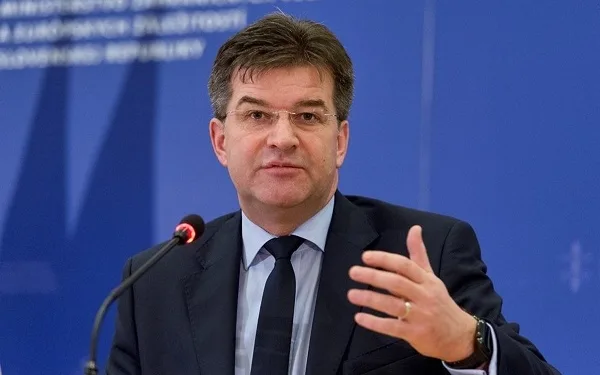Deputy PM for European Affairs Nikola Dimitrov has told Serbian magazine “Nin” that the Macedonian road to EU membership has been incredibly steep but hard work is required on all open issues, adding “we should not allow this defeat of Europe and European values to turn into our own defeat”. On Bulgaria’s veto, he says if the neighbor disputes your language, this cannot lead to a mature relationship based on mutual respect between two European countries.
“The main problem lies in the fact that Bulgaria has opened issues that are anti-European in their core, under the pretense of goodneighborly relations and European integration. In order to have good neighbors, we must also be good neighbors, Harry Truman said. No one can dispute your language, something that is entirely your sovereign right and cannot be subject of recognition or denial by another country,” says Deputy PM Dimitrov.
According to him, this cannot lead to a mature relationship based on mutual respect between two European countries.
“How can our Macedonian language be a problem in the EU integration process, into an alliance that celebrates and fosters cultural and linguistic diversity of European nations as its fundamental value? Therefore, bringing into question the identity of the Macedonian people also endangers the Union’s European identity. Would the EU have existed at all if the prerequisite for its creation would be that all member-states have the exact same views on all historical issues? A vast majority of EU members find these disputes completely irrational and incomprehensible,” says Dimitrov.
He says the past period has been very difficult, both professionally and personally.
“I invested a lot of personal efforts and emotional energy in this process. First the Prespa Agreement, which seemed impossible and now is a model for the entire world, then the 2017 Bulgaria Friendship Treaty, which we thought would ensure the settlement of all open issues with Sofia, then the French blockade and the change of the enlargement methodology. One challenge next to another. And now this challenge with Bulgaria. The Macedonian road towards EU membership is incredibly steep. However, these are the battles of our generation and there is no room for defeatism. If we manage to make an essential step towards the Europeanization of our society, this would be the best we can do for out countries and the best legacy for our children. In fact, nothing truly worthy and grand is easily achieved,” notes Dimitrov.
He adds that hard work is needed on all open issues and North Macedonia should not allow this defeat of Europe and the European values to turn into its own defeat.
“We must show that we are mature countries that must solve issues in a European way, through mutual understanding but also respect. We must strengthen the implementation of the Friendship Treaty but also promote this. Then we must resume the discussions within the historical commission, but among historians not politicians. And of course the reforms, namely national transformation not only a process of formal advancement to EU membership,” says Dimitrov.
According to him, delay of a process should not interrupt another, more important process.
“At the end of the day, we must work with our EU allies so that member-states sooner find the strength to protect the principles that have been violated this time, in order to convince Bulgaria to remove the bilateral issues from the negotiations and free the accession process from the political capture it is currently in,” says Dimitrov.
The Deputy PM adds that Europe must be guided by its own example and that the Union is not and should not only be a giant market.
“We have been hearing for decades that the EU is, first and foremost, a community of values. If this is true, then the European integration process should not be turned into an instrument that goes against the self-identification right of the Macedonian people,” says Dimitrov.
He says the Balkans has no other path but the one leading to EU membership, but this path must be open and functional, providing the chance for progress, because the opponents of this process are tireless, both at home and abroad.
“The more Europe delivers on its promises, the more people in the region will believe in it. We saw how a former blockade (Greece’s veto to Macedonia’s NATO membership in Bucharest in 2008) can result in complete political decadence and backsliding towards totalitarianism and nationalism. We needed a whole decade to recover from that and we are still fighting with this political legacy. This time we must resist this temptation by delivering mature policies and working hard on becoming winners,” concludes Deputy PM Dimitrov in the “Nin” interview.




